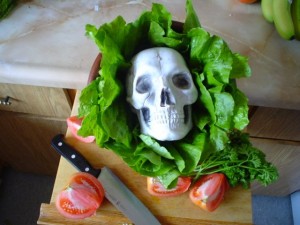Jeanette Severs of Stock and Land reports that Victoria’s health department could have prevented an outbreak of Salmonella poisoning from eating lettuce, as the number of suspected cases, nationally, rose to 144.
 While 108 Victorian people were identified suffering from Salmonella Anatum, the same bacteria identified in lettuce last week, only nine cases were confirmed linked to consumption of the lettuce product. They were joined by one confirmed case in NSW.
While 108 Victorian people were identified suffering from Salmonella Anatum, the same bacteria identified in lettuce last week, only nine cases were confirmed linked to consumption of the lettuce product. They were joined by one confirmed case in NSW.
But there were also serious doubts about how many people identified suffering from the bacteria, could blame the lettuce from Tripod Farmers.
Victoria’s health department spokesperson, Bram Alexander, told Stock & Land the health department also ignored a batch of Tripod Farmers lettuce identified with the bacteria on January 21.
Tripod Farmers confirmed they were notified on January 22 that a sample from a batch of product tested positive to Salmonella Anatum.
“There was one earlier positive test of the product detected on January 21, but the product was out of date,” Mr Alexander said.
Uh-huh.
He said action was not taken because no one would have consumed the product past its use-by date and there had been no noticeable spike in Salmonella diagnoses as far as the health department was concerned.
“Lettuce has a relatively short shelf life, so that in itself did not raise the temperature,” he said.
 “The temperature was raised last Wednesday, when there was a spike in cases reported.
“The temperature was raised last Wednesday, when there was a spike in cases reported.
“From food histories taken from some people and testing, there were some definite genotyping links to Salmonella Anatum in those people and the bacterium identified at Tripod Farmers’ processing plant.”
Tripod Farmers’ managing director Frank Ruffo snr said the company detected the Salmonella Anatum bacteria through its normal testing procedures; where each batch of product was tested.
The entire processing plant underwent sterile cleaning, additional to its daily cleaning regime.
“We immediately recalled the entire production batches. Unfortunately, because the supermarkets are no longer taking the product, we’ve had to suspend part of the farming and processing operations,” he said.
Ausveg wanted to assure consumers their safety was paramount.
“The number one priority of the industry is the safety of the consumer. Salad leaf products on the supermarket shelf are safe,” said spokesperson Shaun Lindhe.
Retailers need to turn over new leaf
10.feb.16
Courier Mail
Doug Powell
I prefer a cut-up variety of fibre-rich vegetables. A few years ago I toured my local supermarket with the two heads of food safety – both now gone.
We spent about two hours going through the store and I pointed out labelling problems, lack of hygiene and asked how were consumers supposed to know what food was safe?
Now there is a problem with bagged lettuce packaged up and served at some supermarkets interstate, with 28 (144) people sick. This is nothing new.
But it is tragic that people continue to get sick from the food that should nourish them. Fresh fruits and vegetables are the cornerstone of a healthy diet. Because they are fresh, anything that comes in contact has the potential to contaminate.That means food safety starts on the farm.
Washing produce may make you feel better and government agencies advocate washing, but with fresh produce washing does little.
It may remove some of the stuff that a three-year-old sneezed on it but, microbiologically, not much else.
The key is to have programs in place to reduce contamination.
Twenty years ago, my lab started working with Canadian farmers to limit contamination on fresh produce farms.
Of particular importance was quality of irrigation water, manure and employee handwashing.
You see a bird, I see a salmonella factory. We can’t kill all the birds but we can take appropriate steps to reduce risk.
Fresh produce has been the leading cause of foodborne illness in North America for two decades.
Right now there is an outbreak of listeria on Dole-packaged salads in Canada and the US that has killed two and made 20 ill. Are packaged salads the villain?
Yes and no.
There has been much debate in the food safety community over whether pre-packaged salads are a good thing or a bad thing
I agree with a scientific advisory committee in the US that pre-packaged salads are safer because your sink is a pool of germs.
But only if the companies producing the stuff – and making the profit – can prove it.
During one of my many supermarket trips, I asked the store manager if he washed pre-packaged greens. He replied, “Of course, why wouldn’t I, my wife does it.”
Oh, Australia.
There are no labels with recommendations on pre-packaged salads in Australia. There are no guidelines. There is no public disclosure.
If 28 people got sick, there’s a lot more for it to bubble up to Australian media.Retailers should be clear about practices and sourcing. And they should market food safety.
One means of doing this is to make sure the packaging of the produce they’re selling contains information about not only where the product was sourced but how it was produced – the farming practices. This could be as simple as including a URL address consumers can visit for information about the product or a QR code they can scan with their smartphone.
Dr Douglas Powell is a former professor of food safety in Canada and the US who shops, cooks and ferments from his home in Brisbane.
